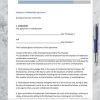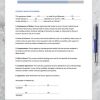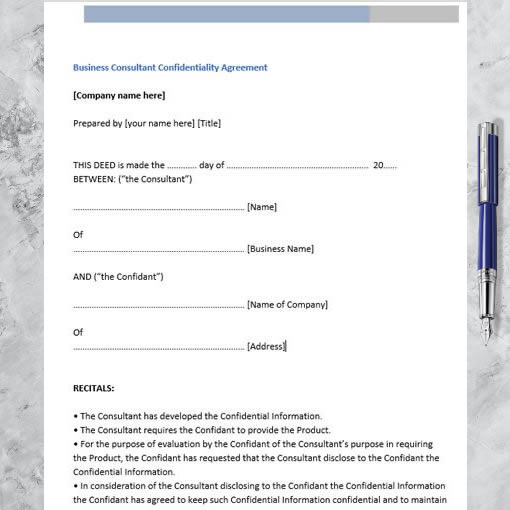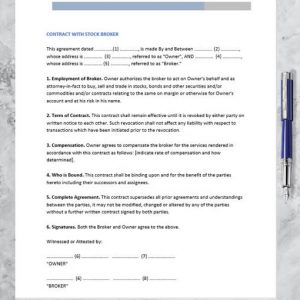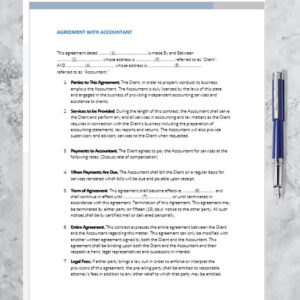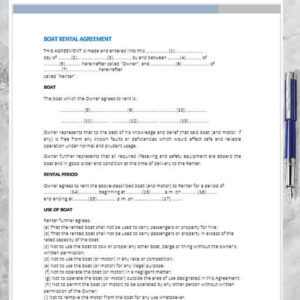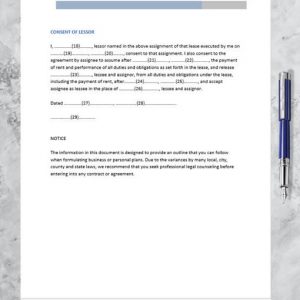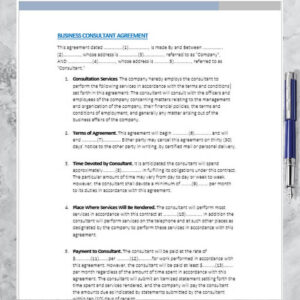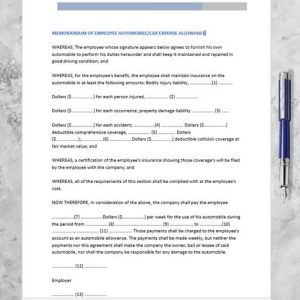Legal Consultant Confidentiality Agreement template. Used when working with individual/company providing consultant services to your business. Stating on keeping the details availed to him/his company, confidential and not to share. Download, edit & print in minutes.
Included:
- 4-pages Consultant Confidentiality Agreement template
- Two formats – Microsoft Word Doc file (editable) & PDF file
Also known as Non-Disclosure Agreement (NDA)
Use our professionally drafted Non-Disclosure Agreement (NDA) to protect against the disclosure of sensitive and confidential information.
Protect & preserve confidentiality between two businesses by using our two-way Non-Disclosure Agreement (NDA). Our mutual NDA gives protection to both businesses who want to share confidential information with each other and gives them the confidence of knowing that the information will not be divulged to a third party. You can have the confidence to get to know each other properly in order to make an informed decision as to whether to do business together or to enter into any other long-term partnership.
What is a Non-Disclosure Agreement/ NDA?
A NDA is a legal contract that gives protection to parties who want disclose confidential information to each other.
When to use a Non-Disclosure Agreement
Use our Non-Disclosure Agreement/ NDA:
- If you want to exchange sensitive, confidential and essential information with a third party business or person.
- To ensure the other party understands that the confidential information being shared is valuable.
- To define what constitutes as confidential information and what does not: and
- To impose requirements on how that confidential information should be protected.
What does a Non-Disclosure Agreement cover?
Our Non-Disclosure Agreement/ NDA covers:
- the definition of confidential information
- how to protect the confidential information
- which parties are allowed to receive the confidential information
- the disclosures that are required by law
- how to terminate the Agreement; and
- all remedies available for any breach of confidentiality
When do I need to use a Non-Disclosure Agreement?
There are various situations when you may need to sign an NDA are varied. The most common scenarios would include:
- engaging a consultant in your business
- discussing taking on potential investors or joint venture partners
- taking on a new employee
- discussing the sale of your business with interested parties; or
- creation and development of new products.
Signing a NDA with all the parties in these scenarios gives you the confidence and protection to share confidential and sensitive information. The NDA protects the confidential information by ensuring that any party receiving the confidential information cannot disclose it to a third party (except within agreed circumstances) and outlines the penalties if the information is shared.
What types of information can be protected by a Non-Disclosure Agreement?
Most information can be classed as ‘confidential information’. You can protect your commercial information as well as your personal information. Types of confidential information that can be protected by an NDA may include financial information, databases, trade secrets, patents, and other proprietary or classified information.
What is the purpose of creating the Non-Disclosure Agreement?
The NDA must be created for a specific purpose, also known as the disclosure or permitted purpose. Disclosing the information must be for a specific reason and must be legitimate. The purpose should be as clear as possible, e.g. to advance the sale of your business.
What information is not considered to be confidential in a Non-Disclosure Agreement?
Some information is not deemed to be confidential even though it may be sensitive. For instance:
- If the information is already known to the receiving party at the time of disclosure;
- If the information is already known to the public;
- If a third party had previously disclosed the information to the receiving party and that third party did not breach any legal or contractual obligations when he revealed that information; or
- If the information is required to be disclosed by law or rules of any court.
When does a Non-Disclosure Agreement come to an end?
The period for which each party must keep the information confidential will vary depending on the circumstances. NDAs can be terminated immediately by giving notice in writing. Both parties should decide a realistic time frame for the NDA as information can lose its commercial value or confidential nature over time.
What are the legal remedies available for breach of a Non-Disclosure Agreement?
Breaching a NDA usually means that a receiving party has disclosed confidential information to an unauthorised third party and usually results in financial loss for the disclosing party. Remedies available include damages and/or an injunction to stop the use of the information.
You should seek legal advice quickly if you believe the terms of your NDA have been breached.

